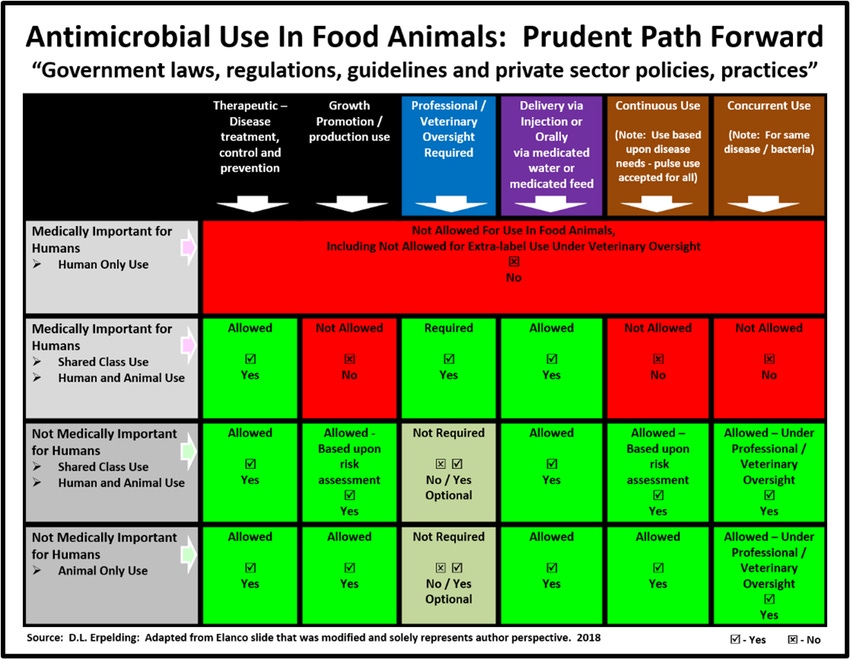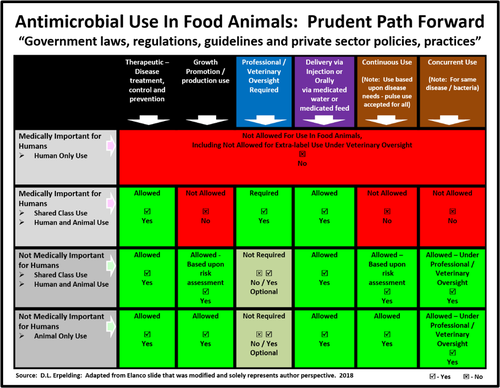Save lives, control illnesses and prevent diseases via responsible use and care.
November 20, 2020

Save lives, control illnesses and prevent diseases via responsible use and care.
World Antimicrobial Awareness Week (WAAW), Nov. 18-24, provides an opportunity for all to reflect on uses of antimicrobials, or antibiotics, whether in animals, humans or plants. Are we following the science? Are we being responsible stewards? Are we providing proper animal care? Are we minimizing our contribution to antimicrobial resistance (AMR) risks? What have we learned in 25 years?
Antimicrobials are precious resources, and their appropriate use needs to be ensured through responsible use stewardship and adopting best practices to reduce the need for their use. Antimicrobials can save lives, control illnesses and prevent diseases. In order to do each and preserve antimicrobial effectiveness, it's critical that all involved in antimicrobial use decisions act responsibly and with care.
The tripartite of the World Health Organization, the World Organization for Animal Health and the U.N. Food & Agriculture Organization established the slogan “Antimicrobials: Handle with Care,” which is designed to unite to preserve antimicrobials and prevent drug resistance. WAAW aims to increase awareness of global AMR and to encourage best practices to avoid the further emergence and spread of drug-resistant infections. This is an appropriate slogan, and these are laudable aims.
Are we following the science? To address this question, in regard to food animals, AMR needs to be of primary concern for resistance development in the animal reservoir, thus maintaining efficacy on the farm.
Also, it remains a public health concern in the food reservoir in relation to the foodborne pathogens campylobacter and salmonella, specifically regarding fluoroquinolone resistance. For all other AMR threats, the human reservoir resistant threats are primarily due to community- or hospital-acquired bacteria, and thus, the major impact will be derived from actions within the human health sector.
Are we being responsible stewards? Absolutely. The food animal sector continues to increase its stewardship actions globally through policy and at the farm level. Farms, companies and organizations, nationally and globally, have adopted policies and practices to ensure the responsible use of antimicrobials.
Excellent examples are the International Poultry Council's (IPC) "Position Statement on Antimicrobial Use & Antimicrobial Stewardship Principles” and "Best Practice Guidance to Reduce the Need for Antibiotics in Poultry Production.” These living documents provide ideas on policies and practices for all in the global poultry sector and can also serve the broader food animal sector.
Are we providing proper animal care? Specific to animal care, let us first look at the uses of antimicrobials, which the IPC papers define as therapeutic use and growth promotion/production use.
Therapeutic use includes:
* Disease treatment (curative) use — Any specific procedure used for the cure or amelioration of a disease;
* Disease control (metaphylaxis) use — Practices aimed at reducing the spread or incidence of a disease, and
* Disease prevention (prophylaxis) use — Reducing the likelihood of a disease where there is a high probability of the occurrence of a disease in a susceptible population.
Growth promotion/production use includes shifting the microflora in the gastrointestinal tract for better balance of beneficial and harmful bacteria, thus improving nutrient utilization to support healthy growth and improved performance. Nutritional efficiency, feed efficiency and average daily gain are indicators of response.
Disease management needs and population health practices would indicate that if antimicrobials are available for the therapeutic uses of treatment, control and prevention, then we can provide proper animal care by minimizing the risk, development and impact of disease.
Early disease prevention use may avoid an illness in high-risk animals. Active disease control use may minimize the spread of illness in herds or flocks. Proper disease treatment use may negate severe illness and death. Thus, if these therapeutic options are available to farmers, ideally under veterinary or professional oversight or guidance, then, yes, proper animal care can be provided to minimize illness and death.
Are we minimizing our contribution to AMR risks? Aligning with the WAAW theme, keeping animals healthy -- and, thus, handling them with care -- seems to be appropriate for those responsible for overseeing the health and welfare of food animals.
Food animal producers need to ensure that they provide proper animal care by first enacting best practices to keep animals healthy, thereby reducing the need for antibiotic use. This means strong biosecurity practices, excellent animal nutrition programs and sound health management programs that, combined, minimize the need to use antimicrobials.
Ultimately, reducing the need for antimicrobial use and then using antimicrobials only when needed will minimize contributions to AMR risks.
What have we learned in 25 years? What's most important is to follow the science and avoid the convenience of political expediency. Taking a scientific risk-based approach by diligently applying thorough risk analysis principles via risk assessment, risk management and risk communication is important. Prioritizing resources with a focus on what matters and what is impactful and ensuring best practices is important.
Reflecting on personal experiences over the past 25 years, efforts were underway in the U.S. in the mid-1990s to increase animal drug availability and provide a mechanism for antibiotics to be used in feed under veterinary oversight. This effort provided for the laws and regulations that serve the food animal sector well today.
 However, efforts were underway in parts of the world to remove the use of all antibiotics for growth promotion uses and, in more extreme cases, to remove most uses in food animals. The later efforts have involved extensive utilization of resources and efforts but have not yielded a public health benefit to date. A carefully crafted, scientific risk-based approach is best in order to eliminate or minimize the "risk" without eliminating appropriate and needed uses.
However, efforts were underway in parts of the world to remove the use of all antibiotics for growth promotion uses and, in more extreme cases, to remove most uses in food animals. The later efforts have involved extensive utilization of resources and efforts but have not yielded a public health benefit to date. A carefully crafted, scientific risk-based approach is best in order to eliminate or minimize the "risk" without eliminating appropriate and needed uses.
WAAW is a time to reflect on the best path forward, and it remains critical to prioritize resources. The human and food animal reservoirs each have their own influencers and selection pressures for AMR.
Responsible antimicrobial use practices implemented in the hospital and on the farm do appear each to have affected the prevalence of resistance in their specific reservoirs. However, data to date do not indicate that on-farm antimicrobial usage restrictions have resulted in a public health benefit. Thus, we need to keep our focus on where we can have a definable impact.
We need to be hard on the science, via a scientific risk-based approach, in the law and regulation area. Then, there can be options in the marketplace for various production practices that seek to meet specific market niches, but these should be recognized as options of choice, not ones necessitated by the science on AMR.
In conclusion, considering responsible use and care and an approach of being hard on the science, ideas offered in a June 2018 Feedstuffs article I wrote on an "antimicrobial resistance apocalypse" remain relevant today:
The most prudent path forward for antimicrobial use in food animals is to incorporate a science-based AMR risk analysis process into government regulatory approval processes (Figure). This includes risk assessments with priority focus on those antimicrobials most important for human medicine and risk management decisions that provide for approval of use yet entail limits to ensure appropriate use.
Also, risk communication should ensure that the proper information garnered from the risk assessment and risk management process is provided to those involved in the decision-making and use of antimicrobials.
About the Author(s)
You May Also Like



.png?width=300&auto=webp&quality=80&disable=upscale)

